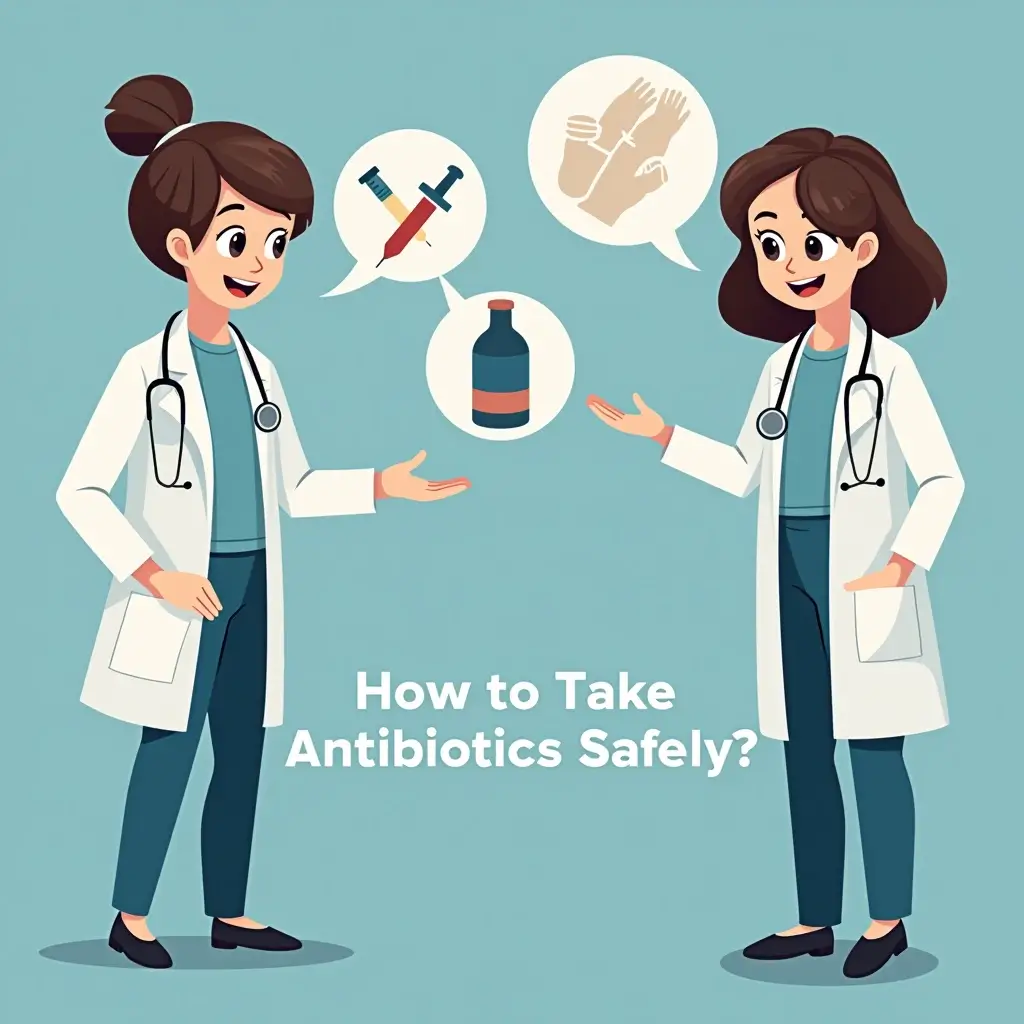Table of Contents
When should you take antibiotics? Medications that target bacteria are powerful tools in modern medicine, treating once life-threatening infections. However, proper timing and usage are critical to avoid resistance and health risks. This article explores signs that indicate when antibiotics are necessary and when to avoid them.
Key Takeaways
- Purpose of Antibiotics: Effective for treating bacterial infections, not viruses.
- Signs for Use: Needed for confirmed bacterial conditions like pneumonia and strep throat.
- Risks of Misuse: Overuse can lead to antibiotic resistance and harm gut health.
- Safe Practices: Take only as prescribed, complete the course, and don’t share them.
- Gut Health Support: Use probiotics and eat fiber-rich foods during and after treatment.
What are Antibiotics and How do They Work?
Antibiotics are medications that specifically target bacteria, either by killing them or inhibiting their growth. They are effective for treating bacterial infections such as pneumonia, strep throat, and urinary tract infections (UTIs).
How Antibiotics Work
Antibiotics target various aspects of bacterial function:
- Cell wall inhibitors (e.g., penicillin) prevent bacteria from building protective cell walls.
- Protein synthesis inhibitors (e.g., tetracycline) stop bacteria from producing essential proteins.
- DNA replication inhibitors (e.g., fluoroquinolones) prevent bacterial DNA from replicating.
By targeting these processes, antibiotics effectively fight bacterial infections without harming human cells. However, they are ineffective against viral infections such as the flu or the common cold, which is a critical point often misunderstood by patients .
When Should You Take Antibiotics?
When should you take antibiotics? These medications are effective only against bacterial infections. When should you take antibiotics for an illness? Only when necessary for conditions caused by bacteria. Using antibiotics for viral infections not only fails to treat the illness but also contributes to antibiotic resistance. When should you take antibiotics to ensure proper use? Look for signs that indicate bacterial infections and consult your healthcare provider. Understanding when should you take antibiotics helps preserve their effectiveness and protects global health.
Bacterial Infections: When Antibiotics are Necessary
Certain bacterial infections require medication to prevent complications and ensure recovery. Below are some of the most common infections where these treatments are appropriate:
- Strep Throat (Streptococcal Pharyngitis): Characterized by a sore throat, fever, and swollen lymph nodes, strep throat is caused by the bacterium Streptococcus pyogenes. Left untreated, it can lead to complications like rheumatic fever. Medications like penicillin or amoxicillin are typically prescribed to shorten symptoms and prevent serious complications.
- Bacterial Pneumonia: Often caused by bacteria such as Streptococcus pneumoniae, symptoms include high fever, chills, chest pain, and difficulty breathing. This condition can be life-threatening, especially in older adults or those with weakened immune systems, and requires treatment to prevent lung damage.
- Urinary Tract Infections (UTIs): UTIs occur when bacteria like Escherichia coli (E. coli) infect the urinary tract, leading to symptoms like painful urination, frequent urination, and lower abdominal pain. If untreated, UTIs can spread to the kidneys, causing more serious infections and requiring medication to clear the infection and prevent complications.
- Bacterial Sinusitis: Although most sinus infections are viral, bacterial sinusitis can develop if symptoms persist for more than 10 days or worsen after initial improvement. Symptoms include thick nasal discharge, facial pain, and pressure. Medication may be prescribed if bacterial involvement is confirmed.
- Skin Infections (e.g., Cellulitis): Bacterial skin infections like cellulitis, caused by Staphylococcus or Streptococcus bacteria, present with redness, swelling, and pain in the affected area. If left untreated, these infections can spread, leading to severe complications like sepsis.
Signs you Shouldn’t Ignore: When Antibiotics are Needed
If you experience any of the following symptoms, it may indicate a bacterial infection that requires treatment. Here are some warning signs that should not be ignored:
- High, Persistent Fever: A fever lasting several days without improvement from rest or over-the-counter medications may indicate a bacterial infection, especially if it exceeds 101.5°F (38.6°C).
- Worsening Symptoms After Initial Improvement: Feeling better initially but then suddenly worsening could signal a secondary bacterial infection, often in cases of sinusitis or bronchitis.
- Pus-Like Discharge: Thick yellow or green discharge, particularly in wounds, sinuses, or the respiratory tract, is often a sign of bacterial infection.
- Severe, Localized Pain: Bacterial infections can cause intense, localized pain, such as chest pain with pneumonia or throat pain with strep throat.
- Breathing Difficulties: Difficulty breathing or shortness of breath may indicate a serious infection like pneumonia, requiring prompt medical treatment.
What type of infection does not need antibiotics?
When should you take antibiotics? It’s essential to know this to avoid misusing them. Antibiotics are ineffective against viral infections, making it critical to differentiate between bacterial and viral illnesses. When should you take antibiotics for an infection? Only when prescribed for bacterial causes. Using antibiotics unnecessarily, especially for viral issues, not only harms gut health but also fuels resistance. By understanding when should you take antibiotics, you can ensure responsible use and protect their effectiveness for the future.
The Common Cold
Colds are caused by viruses, typically rhinoviruses, and antimicrobial drugs offer no benefit. Common symptoms—runny nose, sore throat, coughing, and mild fever—usually resolve on their own within 7-10 days. Rest, fluids, and over-the-counter medications are the best course of action.
Influenza (Flu)
The flu is another viral infection where these medications are ineffective. Symptoms include fever, chills, body aches, and fatigue. While antiviral drugs like oseltamivir (Tamiflu) can shorten the duration of flu symptoms, antibiotics should not be used unless a secondary bacterial infection develops.
Viral Sore Throats
Many sore throats are viral and do not require these medications. If you have a mild sore throat with no fever or pus, it’s likely caused by a virus and will resolve with time. However, a rapid test can determine if strep bacteria are involved, in which case antibiotic treatment may be necessary.
Bronchitis
Most cases of acute bronchitis are caused by viruses, characterized by a cough, mucus production, and mild chest discomfort. These medications should not be used unless the condition is complicated by a bacterial infection. Most cases improve with rest, fluids, and cough suppressants.
What is the main danger of misusing antibiotics?
Taking these medications when they’re not needed, or using them improperly, can lead to serious health risks. The two most significant dangers are resistance and damage to the gut microbiome.
Antibiotic Resistance
Resistance occurs when bacteria evolve to become immune to the drugs designed to kill them. This makes infections harder to treat and increases the risk of superbugs, such as MRSA (methicillin-resistant Staphylococcus aureus) or drug-resistant E. coli. The World Health Organization (WHO) considers this issue one of the biggest threats to global health.
In the U.S., the Centers for Disease Control and Prevention (CDC) estimates that at least 2.8 million people develop infections resistant to treatment each year, resulting in over 35,000 deaths. The overuse and misuse of these drugs are primary contributors to this crisis.
Harm to The Gut Microbiome
These medications not only target harmful bacteria but also kill beneficial ones in the gut microbiome, leading to dysbiosis. This imbalance can cause digestive issues, including diarrhea, bloating, and infections like Clostridium difficile (C. diff), which may lead to life-threatening colitis. Research published in Nature has shown that even a short course can disrupt gut bacteria for months, increasing the risk of chronic health conditions such as obesity, irritable bowel syndrome (IBS), and allergies.
How to Use Antibiotics Safely?
To avoid the negative effects of these drugs, it’s essential to follow safe practices when using these medications.

Only Take Antibiotics When Prescribed
Never take these medications without a prescription, and do not pressure your doctor to prescribe them if they aren’t necessary. Always follow your healthcare provider’s advice and only use them for confirmed bacterial infections.
Complete the Entire Course
Even if you start to feel better after a few days, it’s important to complete the full course of antibiotics prescribed by your doctor. Stopping treatment early can allow bacteria to survive, leading to a relapse of the infection or the development of resistance.
Don’t Share Antibiotics
Never share your antibiotics with others or use leftover medication from a previous illness. Different infections require different antibiotics, and incorrect use can lead to ineffective treatment or antibiotic resistance.
Supporting Your Health During and After Antibiotic Treatment
If you need to take antibiotics, there are ways to support your health and minimize the potential side effects.
Take Probiotics
Taking probiotics during and after antibiotic treatment can help replenish the beneficial bacteria in your gut and reduce the risk of antibiotic-associated diarrhea. Probiotic supplements containing strains like Lactobacillus and Bifidobacterium have been shown to improve gut health and promote a faster recovery of the gut microbiome .
Eat a High-Fiber Diet
A high-fiber diet rich in fruits, vegetables, whole grains, and legumes can support the growth of beneficial bacteria in the gut. Fiber acts as a prebiotic, feeding the good bacteria that antibiotics may have depleted .
Stay Hydrated
Drinking plenty of water is essential, especially if you experience diarrhea as a side effect of antibiotics. Staying hydrated helps maintain digestive health and flush out toxins from the body.
Conclusion
When should you take antibiotics? Antibiotics are powerful tools for bacterial infections, but knowing when to take antibiotics is essential to protect health and prevent resistance. Misusing antibiotics, even unintentionally, can harm you and future generations. Always ask your healthcare provider, when should you take antibiotics, and follow their advice carefully. Using antibiotics responsibly ensures they remain effective for serious infections. Knowing when should you take antibiotics and when to avoid them is key to maintaining their life-saving potential.
References
- Centers for Disease Control and Prevention (CDC). Antibiotic Resistance Threats in the United States, 2019. U.S. Department of Health and Human Services.
- World Health Organization (WHO). Antibiotic Resistance: A Global Threat. WHO Publications, 2020.
- Riedel, S., et al. (2018). Antibiotic Resistance and the Importance of Proper Use. Journal of Antimicrobial Chemotherapy, 73(4), 1100-1112. DOI: 10.1093/jac/dkx507
- Hempel, S., et al. (2012). Probiotics for the Prevention and Treatment of Antibiotic-Associated Diarrhea: A Systematic Review and Meta-analysis. JAMA, 307(18), 1959-1969. DOI: 10.1001/jama.2012.3507
- Dethlefsen, L., & Relman, D. A. (2011). Incomplete Recovery and Individualized Responses of the Human Distal Gut Microbiota to Repeated Antibiotic Perturbation. Proceedings of the National Academy of Sciences, 108(1), 4554-4561. https://doi.org/10.1073/pnas.100008710.
FAQ
- 1. When should I take antibiotics?
Only take antibiotics for confirmed bacterial infections, as advised by your healthcare provider. Common bacterial infections include strep throat, pneumonia, and UTIs. - 2. Why don’t antibiotics work for viral infections like the flu or a cold?
Antibiotics target bacteria, not viruses. Viral infections require rest, hydration, and, in some cases, antiviral medications, not antibiotics. - 3. What are the risks of taking antibiotics unnecessarily?
Using antibiotics when not needed can lead to antibiotic resistance, making future infections harder to treat. It may also harm your gut microbiome. - 4. How can I protect my gut health during antibiotic treatment?
Taking probiotics and eating fiber-rich foods can help maintain a healthy gut balance while on antibiotics. - 5. What should I do if I feel better before finishing my antibiotics?
Always complete the full course to prevent bacteria from surviving and becoming resistant.
Disclaimer: The information provided in this article is for educational and informational purposes only. It should not replace the advice, diagnosis, or treatment of a qualified healthcare professional. Always consult a licensed doctor or pharmacist before administering any antibiotics or treatments.
